
It’s been a year since India’s Prime Minister Narendra Modi shocked the country by banning high value notes in a bid to tackle corruption and bribery. The ban on 500 rupee and 1000 rupee notes, which accounted for 86% of the currency in circulation, has been blamed for the worst GDP rate in 3 years of 5.7%.
India has over 100 million small firms which are estimated to account for 40% of its economy and approximately 80% of all its jobs. These firms have been hit hard by this change as most of their business is done in cash. Two million workers are thought to have lost their jobs in the first half of 2017.
The government has also implemented changes to India’s tax system this year, which have added to the struggle of small businesses as they are more vulnerable to sudden tax and policy changes. Analysts at Capital Economics noted that “It is clear that [the cash ban] severely damaged output and incomes over the past year”
Praveen Chakravarty, an economic commentator and analyst at the IDFC Institute in Mumbai added that “They are predominantly cash based, employ less than ten employees on average and are outside the tax net. They are informal because they can’t afford the costs of formality.” Manmohan Singh, an economist and former finance minister, said that the cash ban and changes to taxation had “broken the back” of small businesses.
According to anti-bribery reports, the ban of cash in order to reduce corruption hasn’t had the effect the government was hoping for. Cash bribes have been replaced with other bribes such as houses, jewelery and holidays. Jagdish Thakkar, a spokesman in the Prime Minister’s office, declined to comment
Tarun Bhatia, managing director at the Indian arm of Kroll Inc commented that “Transparency, post demonetization, has marginally improved but I am not sure it has made a dent on corruption, Of course, there is use of more plastic money than before but I don’t think it is a case where black money is no longer there. It has handicapped but not fumigated the parallel economy.”
The government says that its new policies on cash and taxes will benefit the Indian economy long term. Although they have had a negative effect on small businesses this year, going forward the regulations will bring more people under the country’s small tax net, and will promote the use of digital payments.


Leave a Reply